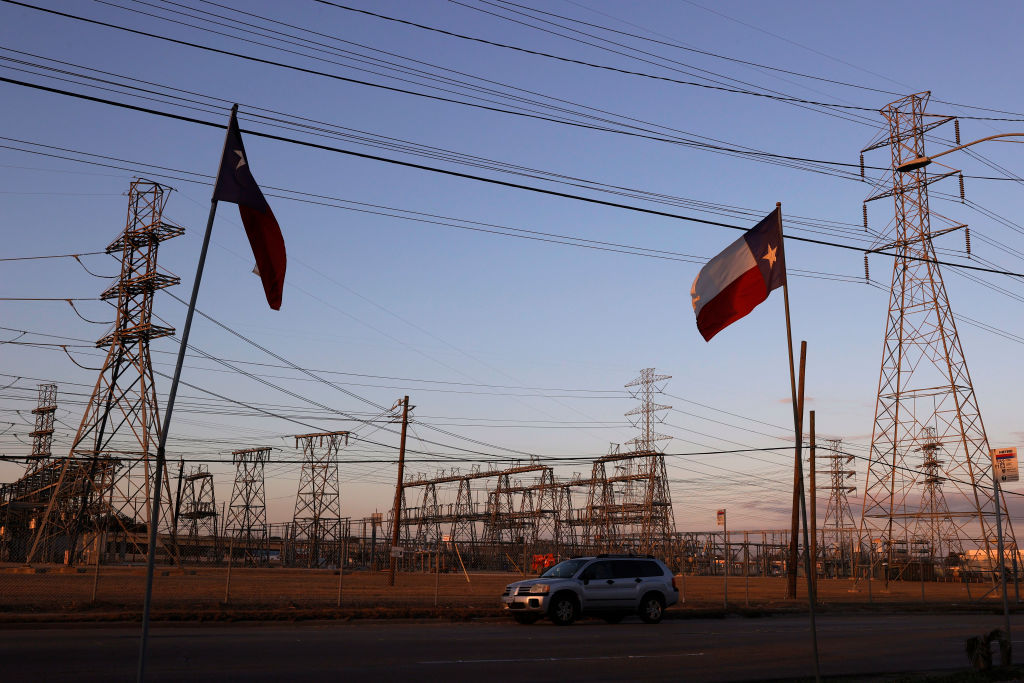Texas racked up a $50 billion energy bill last week. It's not clear who's going to pay it.


A free daily email with the biggest news stories of the day – and the best features from TheWeek.com
You are now subscribed
Your newsletter sign-up was successful
When demand for energy rose sharply last week in unseasonably frigid Texas, and power plants started going offline, the state Public Utility Commission (PUC) allowed wholesale electricity prices to jump to the maximum rate of $9 per kilowatt-hour, a 7,400 percent increase over the normal rate of 12 cents per kilowatt-hour, The Texas Tribune reports. "The rate hike was supposed to entice power generators to get more juice into the grid, but the astounding costs were also passed directly on to some customers."
Texas became national news because its power grid, overseen by the Electric Reliability Council of Texas (ERCOT), nearly collapsed and 4.5 million customers lost power. But "now that the lights are back on in Texas, the state has to figure out who's going to pay for the energy crisis," Bloomberg News reports. "It will likely be ordinary Texans."
"The price tag so far: $50.6 billion, the cost of electricity sold from early Monday, when the blackouts began, to Friday morning," Bloomberg estimates. "That compares with $4.2 billion for the prior week." Texas allows energy retailers to compete for customers, and those who opted for variable-rate plans face huge bills — up to $17,000 in one case. But even utilities with fixed-rate plans "that ran up huge losses as the cost of electricity skyrocketed last week will inevitably try to recoup those through their customers, taxpayers, or bonds," Bloomberg reports.
The Week
Escape your echo chamber. Get the facts behind the news, plus analysis from multiple perspectives.

Sign up for The Week's Free Newsletters
From our morning news briefing to a weekly Good News Newsletter, get the best of The Week delivered directly to your inbox.
From our morning news briefing to a weekly Good News Newsletter, get the best of The Week delivered directly to your inbox.
Texas Gov. Greg Abbott (R), who appointed the PUC, said Sunday he will work with the legislature to address the huge energy bills. But the customers' pain is the energy industry's gain, ProPublica and The Texas Tribune report. After a 2014 freeze, Houston's CenterPoint Energy bragged to investors that it "benefited significantly" from high energy prices during the resulting power squeeze, adding, "To the extent that we get another polar vortex or whatever, absolutely, we'll be opportunistic and take advantage of those conditions."
Under the Texas system, power companies not only aren't required to produce enough energy to avoid blackouts, "they are incentivized to ramp up generation only when dwindling power supplies have driven up prices," ProPublica and the Tribune report. That's incentive structure is a recipe for near-misses — and blackouts, said University of Houston energy expert Ed Hirs.
It is also bad politics right now. "We cannot allow someone to exploit a market when they were the ones responsible for the dire consequences in the first place," said state Rep. Brooks Landgra (R).
A free daily email with the biggest news stories of the day – and the best features from TheWeek.com
Peter has worked as a news and culture writer and editor at The Week since the site's launch in 2008. He covers politics, world affairs, religion and cultural currents. His journalism career began as a copy editor at a financial newswire and has included editorial positions at The New York Times Magazine, Facts on File, and Oregon State University.
-
 Bad Bunny’s Super Bowl: A win for unity
Bad Bunny’s Super Bowl: A win for unityFeature The global superstar's halftime show was a celebration for everyone to enjoy
-
 Book reviews: ‘Bonfire of the Murdochs’ and ‘The Typewriter and the Guillotine’
Book reviews: ‘Bonfire of the Murdochs’ and ‘The Typewriter and the Guillotine’Feature New insights into the Murdoch family’s turmoil and a renowned journalist’s time in pre-World War II Paris
-
 Witkoff and Kushner tackle Ukraine, Iran in Geneva
Witkoff and Kushner tackle Ukraine, Iran in GenevaSpeed Read Steve Witkoff and Jared Kushner held negotiations aimed at securing a nuclear deal with Iran and an end to Russia’s war in Ukraine
-
 TikTok secures deal to remain in US
TikTok secures deal to remain in USSpeed Read ByteDance will form a US version of the popular video-sharing platform
-
 Unemployment rate ticks up amid fall job losses
Unemployment rate ticks up amid fall job lossesSpeed Read Data released by the Commerce Department indicates ‘one of the weakest American labor markets in years’
-
 US mints final penny after 232-year run
US mints final penny after 232-year runSpeed Read Production of the one-cent coin has ended
-
 Warner Bros. explores sale amid Paramount bids
Warner Bros. explores sale amid Paramount bidsSpeed Read The media giant, home to HBO and DC Studios, has received interest from multiple buying parties
-
 Gold tops $4K per ounce, signaling financial unease
Gold tops $4K per ounce, signaling financial uneaseSpeed Read Investors are worried about President Donald Trump’s trade war
-
 Electronic Arts to go private in record $55B deal
Electronic Arts to go private in record $55B dealspeed read The video game giant is behind ‘The Sims’ and ‘Madden NFL’
-
 New York court tosses Trump's $500M fraud fine
New York court tosses Trump's $500M fraud fineSpeed Read A divided appeals court threw out a hefty penalty against President Trump for fraudulently inflating his wealth
-
 Trump said to seek government stake in Intel
Trump said to seek government stake in IntelSpeed Read The president and Intel CEO Lip-Bu Tan reportedly discussed the proposal at a recent meeting
